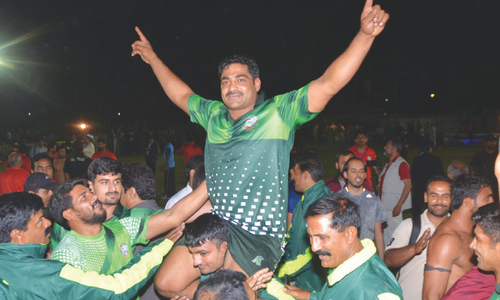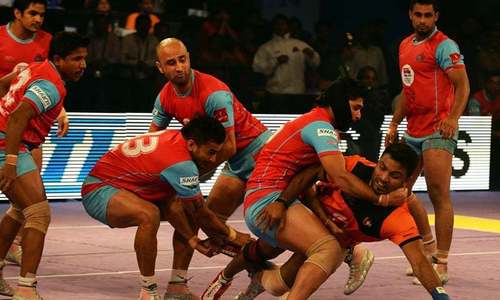Pakistan barred from Kabaddi World Cup in India

NEW DELHI: The 12-nation Kabaddi World Cup kicks off this week in India, with a row over a decision to bar arch-rivals Pakistan from competing threatening to overshadow the tag-wrestling sport's showcase event.
With the World Cup last staged nine years ago, teams are relishing the chance to compete in the two-week event being held in India's western city of Ahmedabad.
However, International Kabaddi Federation (IKF) chief Deoraj Chaturvedi, who is from India, said Pakistan has been denied entry because of a spike in tensions between the two nuclear-armed nations.
“This is not the right time to engage with Pakistan,” Chaturvedi said.
“Pakistan is a valuable member of the IKF but looking at the current scenario and in the best interest of both the nations, we decided that Pakistan must be refrained from the championship.”
Pakistan accused the IKF of unfairly targeting the country, saying both rival nations should have been excluded if there were security concerns.
“We have called a meeting to discuss this issue but let me tell you that a Kabaddi World Cup is no world cup without Pakistan,” said Pakistan kabaddi federation secretary Rana Muhammad Sarwar.
“This is just like a football world cup without Brazil,” Sarwar said.
Pakistan captain Nasir Ali said his players had been favourites to clinch the cup after defeating India at the six-nation Kabaddi Cup held in Pakistan in May and last month's Asian Beach Games in Vietnam.
“We were hoping to win the world cup in India by beating India,” Ali said, adding that fans were being denied matches between the top two sides.
Hostilities between the nations have flared after India said last week it conducted military strikes inside Pakistan against militants, sparking fury from Islamabad.
The strikes came after gunmen staged the deadliest attack on an Indian army base in more than a decade, which an enraged New Delhi blamed on Pakistani-based militants.
New lease of life
The World Cup comes as the ancient game, played in sandy parks across India for generations and once tagged with a dowdy image, is enjoying a new lease of life.
The Pro Kabaddi League, launched in India in 2014 with live television coverage, corporate sponsors and brightly coloured lyrca strips, has proved hugely popular and drawn players from Iran and South Korea.
Iran's skipper Meraj Sheykh, who has played in the league's last three editions, said his side had grown stronger by playing in India and other international tournaments.
“We have more young players playing for us now and they have the experience of playing in India,” Sheykh told the Times of India newspaper.
Formidable Iran clash with newcomers the United States in Friday's opening round of the competition that also includes top sides from Australia, South Korea, England, Poland, Kenya and Argentina.
But the traditional South Asian sport that mixes tag and wrestling and is growing in popularity has been hit with controversy over a decision to exclude highly fancied Pakistan.
Kabaddi requires yoga-like breathing skills as two seven-member teams send a raider into their enemy's half of the court to tag an opponent before returning — in just one breath.
Attackers chant “kabaddi, kabaddi” to prove they are not inhaling. The game is played in around 35 countries, but it is dominated by India, where it originated.
Iran, who lost to India in the previous two world cup finals in 2007 and 2004, have a relatively easy first match against first-timers USA.
An opening-day double header will also see India lock horns with South Korea. A round-robin tournament, the top two sides from the pools will qualify for the semis, with the final on October 22.
















































